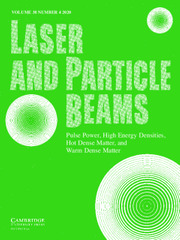Article contents
Study on ablation products of zinc by intense pulsed ion beam irradiation
Published online by Cambridge University Press: 16 January 2017
Abstract
As a kind of flash heat source, intense pulsed ion beam (IPIB) can be used for material surface modification. The ablation effect has important influence on interaction between IPIB and material. Therefore, the understanding of ablation mechanism is of great significance to IPIB application. In this work, pure zinc targets were irradiated and ablated by IPIB. In the ablation process under the different ion beam energy densities, the ablation products were collected by a monocrystalline silicon substrate. By analyzing the ablation products with scanning electron microscope and energy-dispersive spectrometer, the surface morphology, and the spatial distribution of ablation products quantity were obtained. The results are useful for clearing the ablation process and the influence of beam parameter on the ablation effect.
Information
- Type
- Research Article
- Information
- Copyright
- Copyright © Cambridge University Press 2017
References
REFERENCES
- 5
- Cited by

